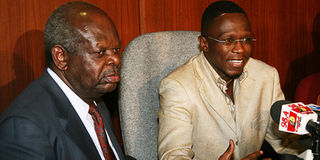MPs mull their options with Ligale report

Interim Independent Boundaries Commission chairman Andrew Ligale (left) with the Justice and Legal Affairs committee chairman Ababu Namwamba during a past press conference. Mr Ligale handed over his commission's report on Friday. Photo/FILE
The report prepared by the boundaries commission which wound up its business on Saturday will be tabled in Parliament this week.
The vice-chairperson of Parliament’s Constitutional Implementation Oversight Committee Ms Millie Odhiambo said MPs have several options as they seek to implement the IIBRC report without a gazette notice.
The report creates 80 new constituencies complete with details of their boundaries.
Ms Odhiambo, also a member of the powerful Justice and Legal Affairs Committee, which received the IIBRC report on Friday night, said:
“I am sure we’ll get a solution through either the Executive or the Legislature, or consultations like the ones going on between the two arms. But all I can say is that Parliament has several good options, some which won’t even require the report to be gazetted.”
The extension of the IIBRC’s mandate requires an amendment to the Constitution, but the commission wound up on Saturday.
Law Society of Kenya CEO Apollo Mboya told the Sunday Nation the onus is now on Parliament to extend the life of the IIBRC team with an amendment to the law such that its life “shall end when it publishes its report”.
Mr Mboya said legally the life of a wound-up commission could be extended if it had pending work of constitutional importance.
“Somebody must publish that report… so Parliament must amend the law, provide for it ‘alive’ and craft the law such that the commission shall continue to exist until the publication of the report.”
He said it would be difficult for anyone to go to court to seek orders to have the current report gazetted because “if the commission’s mandate is not extended, then it does not exist.”
But, even with the extension of the term, Mr Mboya said, the injunctions in court would have to be lifted to allow the IIBRC to do its work.
George Kegoro, the executive director of the International Commission of Jurists (Kenya), in an article appearing elsewhere in this paper, roots for a political solution to the boundaries saga and notes that it has to happen with an extension of the commission’s life.
“The IIBRC would then be allowed a limited period, say two months, within which to publish its report.
“Unlike what it has attempted to do, the IIBRC would be under duty to justify the choices that it proposes to make with regard to the boundaries and everything would be done to avoid the secrecy with which the IIBRC has worked.”
Some MPs have been touting an option to have the IIBRC report presented to the yet-to-be-formed Independent Electoral and Boundaries Commission so that the permanent commission can conclude the work.
But Mr Kegoro notes that it is not in the IEBC’s ambit to handle the delimitation of constituency boundaries before 2012.
IIBRC’s unfinished business includes delimiting constituency boundaries, altering the number, names and boundaries of wards and having the names of both constituencies and wards, together with details of the boundaries published in the Kenya Gazette.




